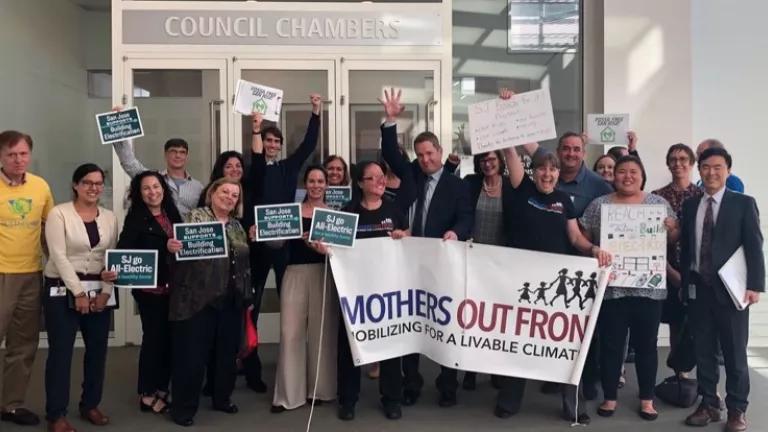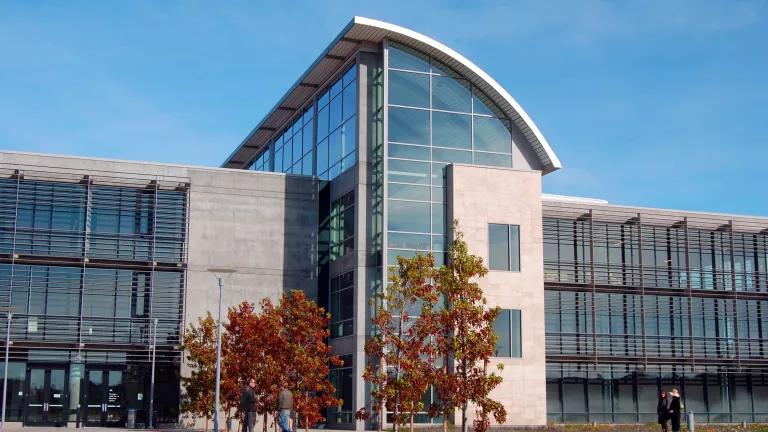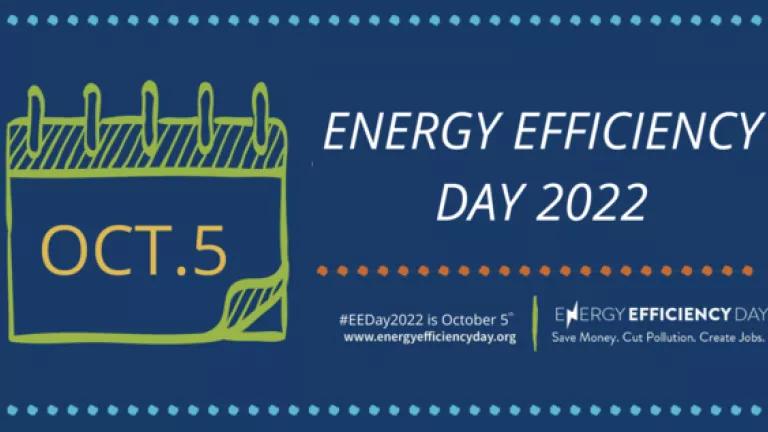Gas Interests Threaten Local Authority
Efforts to strip local communities of decision-making authority over the health impacts and cost of their future homes and buildings have been introduced in several state legislatures. If adopted, these bills could hamstring local government’s ability to lead in the fight against local air pollution and climate change by transitioning from fossil fuels to clean electricity to power their buildings.

Community organizations celebrate San Jose's zero-emissions building energy code.
UPDATE: As of June 12, 2023, 24 states have adopted preemption laws: Alabama, Arkansas, Arizona, Florida, Georgia, Idaho, Indiana, Iowa, Kansas, Kentucky, Louisiana, Mississippi, Missouri, Montana, New Hampshire, North Dakota, Ohio, Oklahoma, South Dakota, Tennessee, Texas, Utah, West Virginia, and Wyoming.
Bills have been introduced but not successfully enacted so far in four states (Colorado, Michigan, North Carolina, and Pennsylvania).
Continuing last year’s worrisome trend, efforts to strip local communities of decision-making authority over the health impacts and cost of their future homes and buildings have been introduced in several state legislatures. If adopted, these bills could hamstring local government’s ability to lead in the fight against local air pollution and climate change.
Local governments are often clean air and climate leaders, taking action to reduce the carbon footprint of everything from the electricity that powers their economies to the buildings their residents live, work, and play in. The fossil fuel industry backed bills proposed thus far in Alabama, Arkansas, Colorado, Florida, Georgia, Idaho, Indiana, Iowa, Kansas, Kentucky, Michigan, Mississippi, Missouri, Montana, New Hampshire, North Carolina, North Dakota, Ohio, Pennsylvania, South Dakota, Texas, Utah, West Virginia, and Wyoming will prevent local decision-making over the fuels used to power homes and other buildings.
This concerted legal strategy to prevent local action—likely in direct response to the growing momentum for healthier, cleaner buildings across the nation—poses a serious threat to climate action. It also continues last year’s worrisome trend where four states—Arizona, Louisiana, Oklahoma, and Tennessee—quickly passed similar legislation backed by fossil fuel interests that stripped local governments of the authority to adopt popular zero-emission building energy codes—sometimes even before local government officials realized what was happening.
We Must Transition Buildings to Cleaner Energy
Buildings are fossil fuel guzzlers that are responsible for about one-third of the gas consumed in the United States each year. This fossil gas (also known as “natural gas”) is used mostly for space and water heating. To address the greenhouse gas (GHG) emissions from burning fossil gas in buildings, municipalities across the country have been using their authorities over building energy codes to incentivize new construction that uses more efficient, cleaner, and healthier electric technologies.
By encouraging that new buildings use efficient electric equipment, local governments ensure that the climate footprint of their communities will continue to shrink as laws and regulations already on the books guarantee an increasingly clean supply of electricity in virtually every state. All-electric buildings also help communities control future costs, by avoiding expensive new gas infrastructure that would otherwise need to be maintained and paid off by customers for decades to come. Eliminating emissions from burning fossil fuels inside homes and other buildings also provides major public health benefits: Occupants of efficient homes with electric appliances and their neighbors breathe healthier air by avoiding toxic gases from gas stoves, furnaces, and water heaters.
Building energy codes allow communities to control the health of their indoor spaces, housing and energy costs, and the quality of their future climate. Not surprisingly, these policies have become very popular. All-electric building codes have been adopted by 40 municipalities in California, two Massachusetts towns have recently requested formal authority from the state to adopt similar policies, and Seattle’s mayor recently announced electrification requirements for new commercial and multifamily buildings.
The Gas Industry Fights Back, Will the People Have a Say?
Because buildings are inherently a local issue, local governments have historically enjoyed broad discretion in determining how to permit their construction. For cities that have passed all-electric or electric-preferred building codes, the mechanism to do so is to allow permits only for buildings with all-electric construction plans, or to offer expedited permitting or other incentives to encourage all-electric construction plans. Most of these state bills, however, reach into this traditional area of local authority and prevent municipalities from passing ordinances that would prohibit—or have the effect of prohibiting—a utility service based upon the type or source of energy to be delivered. In essence, cities would no longer be allowed to shape permitting rules to require healthier, low emission all-electric buildings even if that is what the local community determines its best course of action.
Further, the language of “or have the effect of” prohibiting a utility service in buildings is incredibly broad and could have sweeping ramifications that have not been fully examined for cities and their residents. This language could make it even harder for local building officials to incentivize all-electric construction or tailor policies to the needs and preferences of their communities, and by doing so inadvertently lock communities into decades of paying for expensive fossil infrastructure they never wanted in the first place.
Local Governments Must be Able to Act
States are beginning to plan for a managed transition away from fossil gas. Cities need to have all options available when addressing climate impacts in their communities while continuing to be responsive to the will of their residents.
Rather than prioritizing the interests of the gas industry, states should prioritize the needs of their constituents. That means proactively planning for the evolution of the fossil gas system and supporting a just transition for the gas industry’s workforce. It also means ensuring that cities can act, in partnership with their residents, in a way that makes the most sense for their climate and economic goals–which are increasingly clean and healthy all-electric buildings.
As more states, cities, and individuals transition to all-electric buildings for cost, health, and environmental reasons, the expense of maintaining the gas system will rise for those still dependent on it. States that hamstring cities by disallowing a transition off gas will lock in higher costs for their residents as the rest of the nation moves away from gas infrastructure and the remaining gas customers will be left holding the bag for a costly and underused system.




